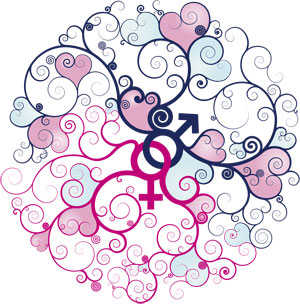The EQ of Sexuality
By Sohema Rehan | News & Politics | Published 14 years ago
A woman’s sexuality is intimately and inextricably linked to her emotional well-being. But there is little realisation of this fact in Pakistani society. The lack of communication between couples often leads to severe, even catastrophic, social and individual problems.
The following case history clearly highlights the ignorant and chauvinistic attitudes towards sex prevailing in our society. The accepted belief is that a woman must be sexually willing and available for her partner whenever he deems fit, no matter what the circumstances. A biologist by profession, Saniya was diagnosed with an ovarian cyst during her first pregnancy within the first year of marriage. The situation called for surgical intervention and two leading gynaecologists of Pakistan were called in. Hours after the operation, barely before the pregnant young woman was out of local anesthesia (she wasn’t administered general anesthesia because of her pregnancy), Saniya’s husband, a successful, award-winning doctor, forced himself upon her. Shocking as it may sound, this brutal act of indifference to a woman’s physical and mental state is not an isolated instance.
It is not surprising then, that Rubina Feroze, associate professor of psychology at the University of Karachi, emphasises that for men the focus of attention is merely the physiological aspect of sex. “For women, many other factors come into play, the primary one being emotions,” says Rubina. “Many men do not even have an inkling of a woman’s capacity for enjoyment, let alone her mental state.”
Take the case of 30-something Shabana, a doctor of Pakhtun lineage who married Farhan, a college batchmate. Shabana is drop-dead gorgeous with clear blue eyes and blonde hair, and so her choice of husband surprised many of her friends simply because, physically speaking, the two were poles apart. Nonetheless, Shabana is devoted to her three children and husband, who in the initial trimester of her first pregnancy stopped her from going to work, ostensibly out of concern for her health. Always conscious of the disparity in their looks and his lack of stature, Farhan began publicly insulting Shabana on the slightest pretext, and it gradually became the norm. His public verbal put-downs, guised in crass humour, were interspersed with extremely emotional outbursts in private. With time, he started objecting to his young wife’s dress sense, make-up and even eating habits until one day, he finally broke down in front of her. Amidst sobs, the 33-year-old Farhan begged his wife to stop dressing up and admitted that her striking good looks made him feel small. In order to save her marriage, Shabana found solace in religion and subsequently retreated behind the veil. Enveloped in a burqa with slits for eye holes, she now avoids any interaction with members of the opposite sex and has, in fact, become a clear outsider in her own family of outstanding professionals. Her rigid religious doctrine and way of life has distanced her from even her own siblings and the colleagues she once worked with.

Photo: Getty Images
One would think that the complete U-turn in Shabana’s lifestyle and personality would have diminished Farhan’s insecurities. But this was not the case. His insulting demeanour continues unabated and he now has the gall to complain that his wife is “too religious to have fun in bed.” He does not think it is unjustified of him to demand titillation from an emotionally battered woman who is using religion as a coping mechanism.
According to the highly acclaimed book, The Psychology of Women by Margaret Matlin, even in the West, the social, psychological and emotional aspects of sexuality are ignored. “With three children vying for my attention and a 10-month-old baby sleeping in the same room, feeling sexy is something that I have left far behind,” says a visibly disturbed 33-year-old Hina. “Till 1 a.m. I am providing for my children after which I just collapse in bed. I have repeatedly told my husband that at this point in life, I need nurturing and cannot give it.” She says she has tried explaining the reasons behind what he perceives to be her frigidity, but to no avail. Clearly overwhelmed by the demands of her life, Hina is at a loss to describe her predicament.
In fact, sometimes other women can be quite insensitive as well. Hina’s frustrations are hardly helped when a close friend, a leading television star with children of her own, condemns her for her boring approach to life. “Men are like dogs,” she asserts cynically, putting forward her own stereotypes. “They only want to be pampered and played with. Women here don’t want to do anything for their husbands and then complain that their husbands don’t do anything for them.” Asked what she does for her husband, the pat reply is that she “does plenty, all of which is unprintable.” She does, however, recommend “pole dancing!” Is the average Pakistani woman’s psyche in sync with pole dancing? Should women anywhere have to resort to such measures? Is the star performer missing the point? She appears to be far removed from the reality of most women in Pakistan. In her own life, she enjoys financial independence and personal freedom, something very few women here can boast of.
“Many women in their 30s have been shown to develop more confidence in their sexuality, but a lot of it is interlinked with a stronger foothold in some other aspect of life which in turn boosts self-esteem,” explains Rubina. These factors vary from professional achievement to greater control over domestic and family environments. But is the Pakistani male ego so easily threatened by a confident woman or affronted by a female who wants more and is not afraid to ask for it?
“Attitudes are changing and today’s man is not as bigoted as the previous generations,” thinks Rubina. But is this only when it works to his advantage? “I can’t say, but the men I have come across no longer consider sex taboo. They definitely see it as linked to other areas of their relationship like communication, equality, financial control, etc. This is a universal phenomenon and not restricted to our part of the world.”
Rubina says her patients are not very vocal about sexual issues until probed and she finds women more receptive to discussing problems. However, in her case it could be the natural hesitation of the men to discuss such matters with someone of the opposite gender. And how often do women discuss such matters with their peers? “Obviously, it varies among individuals, but generally sex is a private matter between couples. People might make jokes on a superficial level, but very few would actually sit down and dissect their physical relationships,” says Rubina.
Twenty-four-year-old Tehmina, however, disagrees. Recently married, she was shocked when pestered by members of her new family who wanted the details of her private life. She attributes their insensitive nosiness to lack of education. However, Mrs Omar, a 55-year-old school teacher, laughs at such “prudishness” and talks of open discussions at her workplace among colleagues as “information sessions.” In fact, she reminisces about her youth when, after dinner parties, the men would exchange the latest “hot” videos which ultimately became the topic of discussion among the womenfolk a few days later.
It appears then that sex, for most people, is just that — fodder for an evening’s salacious entertainment, producing giggles among begums. Meanwhile sex education in the country is largely imparted in the form of family lore, peppered with unrealistic media portrayals. The local electronic media is hesitant to discuss anything to do with the issue. Dialogues about sexuality are always linked to values and thus any frank discussion is hampered by the fear of appearing less than virtuous on the part of the participants.
 Attempts to air serious concerns are usually shunned. This is something that Maira, now 43, has learnt the hard way. Living in a joint family with apparently sympathetic sisters-in-law, she was a young bride when she complained to her own family, as well as her husband’s, that Saad had no interest in her. It gradually came to light that even after several months of marriage, the young couple had hardly been physical. Instead of being supportive towards the young woman who was confused by her husband’s lack of emotional as well as physical interest in her, she was labelled as “fast” by her in-laws. Even her own family felt that she had not done enough to lure her man. Maria was blamed for his inadequacies until it came to light that her husband was, in fact, gay. Such negative messages only reinforce the stereotypes about a woman’s emotional and physical needs.
Attempts to air serious concerns are usually shunned. This is something that Maira, now 43, has learnt the hard way. Living in a joint family with apparently sympathetic sisters-in-law, she was a young bride when she complained to her own family, as well as her husband’s, that Saad had no interest in her. It gradually came to light that even after several months of marriage, the young couple had hardly been physical. Instead of being supportive towards the young woman who was confused by her husband’s lack of emotional as well as physical interest in her, she was labelled as “fast” by her in-laws. Even her own family felt that she had not done enough to lure her man. Maria was blamed for his inadequacies until it came to light that her husband was, in fact, gay. Such negative messages only reinforce the stereotypes about a woman’s emotional and physical needs.
“Problems related to sexuality cannot be ignored,” says Dr Sadiah Ahsan Pal, a professor and consultant gynaecologist practicing in Karachi. She asserts, “Any disturbance in sexual desire or in phases of the sexual response cycle also cause great distress and interpersonal difficulty. These problems can range from sexual unresponsiveness to hormonal imbalance.” Traumatic sexual experiences in the early years can be a cause of great anxiety and stress in the early stages of married life. Not surprisingly, a history of abuse is a major contributing factor to sex-related problems. Coercion in such cases can further add to the problem. Sex education for teenagers from a trusted, reliable source, can be crucial in avoiding unnecessary misinformation that can negatively impact future relationships.
Meanwhile, Shabana’s actress friend emphasises that she takes care of her libido and maintains her energy levels with vitamins and the right food. Simply a break from mundane routines is enough to take care of minor emotional issues for which other techniques include reducing anxiety, restructuring thoughts, training in self-arousal, encouraging fantasy and using imagery techniques. But for any of these to have effect, communication between couples is the key.
Also, none of these techniques address the important problem of gender inequalities in sexual relationships. Then again, attempts to study sexuality inevitably run into a road block in the absence of concrete, empirical data. Even western scientific data underlines the fact that chauvinistic double standards about female sexuality hold true: women aren’t supposed to be interested in sex, while male sexuality is emphasised. Women are afraid of appearing selfish and voyeuristic and may themselves help to reinforce stereotypes, which are a major contributing factor to sexual disorders. In such an environment, men may continue to boast of their sexual prowess, but are women really to be blamed if they view sex as nothing but a mundane chore on their daily roster of marital obligations?
Related Posts:


